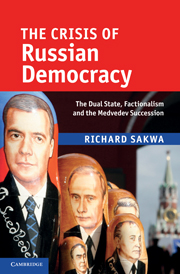Book contents
- Frontmatter
- Contents
- List of tables
- Preface
- Acknowledgements
- Note on transliteration
- 1 The dual state in Russia
- 2 Succession struggles and electoral contests
- 3 Political power and factionalism
- 4 A genuinely political economy
- 5 Managed succession
- 6 War of the Putin succession
- 7 Duma selection
- 8 Presidential succession
- 9 Medvedev's challenge
- 10 Conclusion: transcending the dual state
- Bibliography
- Index
8 - Presidential succession
Published online by Cambridge University Press: 05 June 2012
- Frontmatter
- Contents
- List of tables
- Preface
- Acknowledgements
- Note on transliteration
- 1 The dual state in Russia
- 2 Succession struggles and electoral contests
- 3 Political power and factionalism
- 4 A genuinely political economy
- 5 Managed succession
- 6 War of the Putin succession
- 7 Duma selection
- 8 Presidential succession
- 9 Medvedev's challenge
- 10 Conclusion: transcending the dual state
- Bibliography
- Index
Summary
The Duma election provided Putin with what he wanted – a vote in support of the system he had created and a referendum endorsing his views on policy continuity. The plebiscitary element in the parliamentary elections clearly undermined the typical purpose of an election, which is to choose between independent alternatives, and thus the legitimacy of the post-election order was both confirmed while at the same time impaired by the manner in which it had been achieved. Despite the endorsement that he received in the parliamentary vote, and public expressions of the view that ‘Putin saved us from catastrophe so let's keep him in power’, Putin remained committed to his pledge not to run for more than two consecutive terms. In choosing his successor, as with the Duma election, two processes ran in parallel. In the words of Konovalov, ‘The specific feature of the Russian election campaign is that the real election struggle is being waged among various power groups rather than among officially registered candidates for the post of president.’
Rules and stratagems
The reshuffle of September 2007 signalled that Putin would seek to retain a guiding role in the transition until the very last moment. The lack of an independent political base of any of the leading candidates meant that he remained arbiter to the very end. All viable candidates presented themselves as emanations of the Putin plan to ensure elite and policy continuity.
- Type
- Chapter
- Information
- The Crisis of Russian DemocracyThe Dual State, Factionalism and the Medvedev Succession, pp. 263 - 300Publisher: Cambridge University PressPrint publication year: 2010



